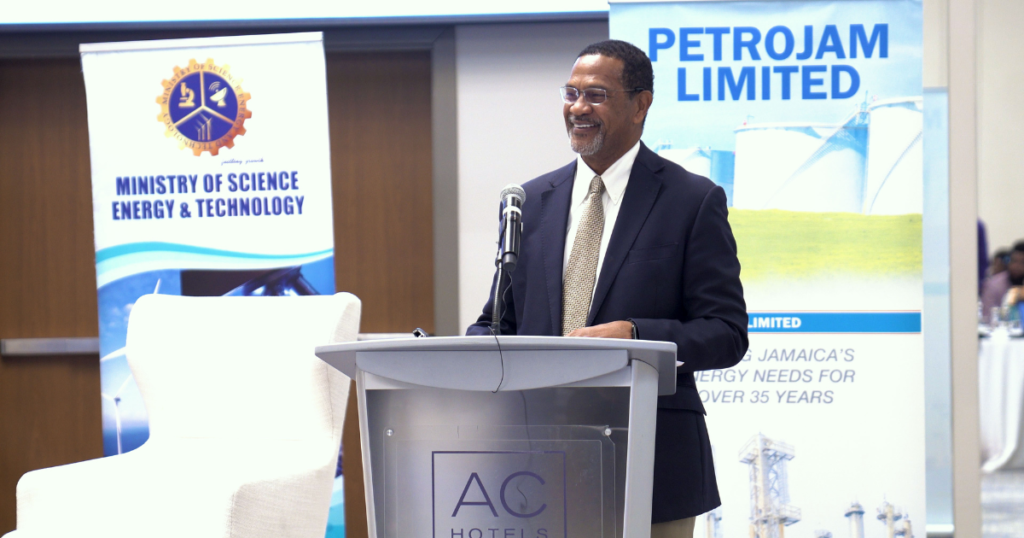Winston Watson, General Manager of Petrojam Limited has called on private sector leaders to strive for a greater appreciation and understanding of the distinction between the markets for crude oil and finished petroleum products, in order to better understand the company’s pricing strategy.
Speaking on Wednesday, September 21 at the company’s Private Sector Breakfast Forum, held at the AC Marriott Hotel in Kingston, the Petrojam General Manager said that most of the concerns expressed throughout the years about the company’s price movements, is based on a misunderstanding of this distinction between the two markets.
The Forum had the support of the Minister of Science, Energy and Technology, Hon. Daryl Vaz, and Petrojam’s Board Chairman, Wayne Chen.
“Petrojam purchases products at the US Gulf Coast reference price for finished products because it is a massive market; the pricing is transparent, and not easily manipulated by individual players. The market for crude oil in many regions uses the West Texas Intermediate (WTI) or Brent pricing.
Most of the news on global prices are for crude oil products, but it is essential to note that Petrojam’s prices are for finished or refined products,” Mr. Watson explained.
Addressing concerns about price movements, recently expressed in the media by several private sector interest groups, the General Manager explained that the Russia-Ukraine war resulted in unprecedented price increases globally.
However, Jamaica did not feel the full impact of these price movements because of the role of the company’s Market Adjustment factor in reducing volatility in the Ex-Refinery prices. The Market Adjustment is a price-smoothing factor, which shields customers from adverse price shocks.
Mr. Watson said that based on the company’s pricing policy, which is approved by its parent Ministry, the Ministry of Science, Energy and Technology, there are established price bands, which govern the levels of weekly price increases and reductions passed on to the public
“Based on this mechanism, price movements to the market does not exceed $4.50, which is the maximum allowable by the policy. This explains the recent increases of J$4.50 that were announced by the refinery in recent months, particularly during the early months of the Russia-Ukraine war. At the time, Petrojam was temporarily absorbing the difference,” he noted.
“There were instances where prices rose in excess of $20. However, we only passed on $4.50 to the consumers, in accordance with Petrojam’s Pricing Policy” he added, as he shared several examples where the company had to shield the country from massive product price movements.
The Petrojam GM noted that the company has sought to carefully manage the accumulated market adjustments, and, as prices have begun to move downwards, in keeping with policy, the company also has to manage the reductions passed onto the public, in a bid to gradually recover the amounts that were temporarily absorbed by Petrojam over the past months.
Hon. Daryl Vaz, who highlighted the need for meaningful exchange between Petrojam and key stakeholders groups. “It is essential that all stakeholders, including the business community and average Jamaicans, understand how Petrojam prices are determined.
I am pleased Petrojam has been working to convey that message to the public and today’s event is the start of what needs to be done to help reduce levels of scepticism by the public concerning Petrojam and the pricing of its products,” he stated.
Chairman of Petrojam’s Board of Directors, Wayne Chen was also pleased with the initiative. “It is critical for us to be here this morning because fuel is a crucial component in our daily lives. The fuel price speaks to national competitiveness, household disposable income, and so much more,” Mr, Chen noted.
“The challenge we have had for many years is that although the pricing mechanism is not new, the environment has changed. Petrojam has gone from being a monopoly to operating in a competitive environment.
We hope this will be the first of many engagements with the public and stakeholders to explain what we do and why we do it and get feedback and buy-in.”
The Question and Answer Session enabled vibrant and interactive exchange from participants, providing an avenue for clarifications, suggestions and an update on Petrojam’s strategic plans and projects.
Participants at the forum included private sector interest groups, including the Private Sector Organisation of Jamaica (PSOJ), Jamaica Manufacturers and Exporters Association (JMEA), Jamaica Chamber of Commerce (JCC), Small Business Association and the Transport Operators Development Sustainable Services (TODSS) attended by several leaders and representatives of major manufacturers). Consumer interests were represented by the Consumer Affairs Commission (CAC) and Fair Trading Commission (FTC).




